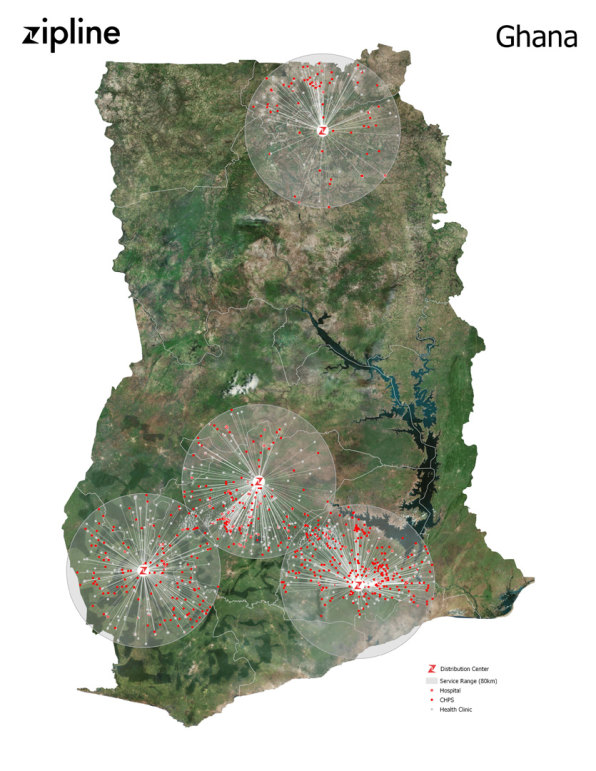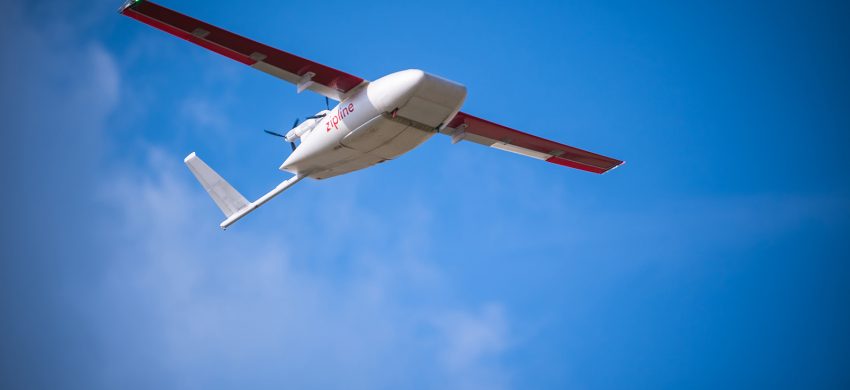Zipline, which is already delivering medicine in Rwanda, is about to take on an even bigger project: As many as 600 flights a day, serving 12 million people at more than 2,000 health centers.
When doctors at New Tafo Hospital in a city in Eastern Ghana need emergency medicine or blood for a transfusion and the hospital doesn’t have it in stock, they just need to send a text message and 15 minutes later, a drone will arrive and the medicine will drop from the sky with a parachute.
The drones take off and land at the first of four drone delivery centers in the country–a network that will serve 2,000 health centers and 12 million people, making as many as 600 flights a day on behalf of the government. The network, run by a company called Zipline, is the largest drone delivery service in the world.

In the U.S., where Jeff Bezos first started talking about drone delivery in 2013, the technology is being implemented much more slowly. This March, a healthcare campus began running a small drone delivery service in Raleigh, North Carolina as part of a pilot between the drone company Matternet, the FAA, and UPS. In Africa, by contrast, Zipline’s regular drone delivery began in Rwanda in 2016, has flown more than 1 million kilometers to date, and covers the whole country. Now Ghana will have the same service at a larger scale.
“Ghana has an administration and government that are investing really heavily in infrastructure and healthcare and technology,” says Keller Rinaudo, CEO of Zipline. “We’ve built this partnership with them where they want to provide universal access to health care nationally, and this is obviously a huge step in that direction–making sure that every single person in the country ideally can be within a 15-minute delivery of any essential medical product.”
It’s solving a challenge that exists globally: It’s hard to get medicine and vaccines from central storage facilities to remote hospitals and healthcare centers at the right time. In the U.S., either medicine is stockpiled to have on hand and wasted when it expires, or rural patients are forced to make expensive trips to faraway hospitals. In Africa, if medicine or units of blood aren’t on hand, it could mean that a patient will die.
When Zipline began working in Rwanda in 2016, it was the first drone service to operate in the world, and the team has continuously refined the system. “We’ve had to iterate on every part of the system: The software, the distribution center design, the way we design air traffic control, the way that we integrate with the healthcare system and with the regulator–all of that had to change to make it possible for us to operate at this scale,” says Rinaudo. It took two years in Rwanda to go from serving one health center to 25; in Ghana, the company will take a year to go from one health center to 2,000.
The company is now preparing to launch in several other countries, including the U.S. Those launches will be informed by what the company has learned in Africa–and will likely be led by the African engineers who have perfected the existing systems. “These amazing Rwandan flight engineers and fulfillment operators and Ghanaian flight engineers and fulfillment operators are basically doing what the richest companies in the world are trying to do but failing at,” says Rinaudo.



